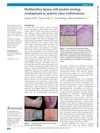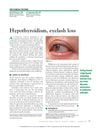 June 1972 in “Archives of internal medicine”
June 1972 in “Archives of internal medicine” Androgens play a key role in hair growth.
 October 2015 in “Annals of Internal Medicine”
October 2015 in “Annals of Internal Medicine” Dutasteride, fesoterodine, and finasteride help older patients with urinary issues.
7 citations,
September 2019 in “European Journal of Case Reports in Internal Medicine” Linagliptin may cause hair loss and skin blisters.
 February 2010 in “Journal of The American Academy of Dermatology”
February 2010 in “Journal of The American Academy of Dermatology” A woman with Degos disease managed her condition for nine years with medications and had two healthy pregnancies, while a separate finding suggests a possible link between female pattern hair loss and high blood pressure.
 February 2010 in “Journal of The American Academy of Dermatology”
February 2010 in “Journal of The American Academy of Dermatology” A woman with thymoma developed a rare chronic condition similar to graft versus host disease after surgery.
 February 2010 in “Journal of The American Academy of Dermatology”
February 2010 in “Journal of The American Academy of Dermatology” The document concludes that using gadolinium-based contrast agents during MRI can be linked to Nephrogenic Systemic Fibrosis in patients with severe kidney disease.
 February 2010 in “Journal of The American Academy of Dermatology”
February 2010 in “Journal of The American Academy of Dermatology” Women with androgenetic alopecia may have higher blood pressure levels.
 6 citations,
January 2011 in “Journal of veterinary medical science”
6 citations,
January 2011 in “Journal of veterinary medical science” Using a video otoscope effectively treated ear infections in dogs.
 5 citations,
January 2006 in “Journal of veterinary medical science”
5 citations,
January 2006 in “Journal of veterinary medical science” RNA can be extracted from horsehair roots for analysis.
 36 citations,
April 1990 in “Dermatologic Clinics”
36 citations,
April 1990 in “Dermatologic Clinics” Most pregnant women experience skin changes like darkening and stretch marks, and some may have skin conditions that usually get better after giving birth.
 3 citations,
July 2012 in “British journal of hospital medicine”
3 citations,
July 2012 in “British journal of hospital medicine” The guide helps clinicians diagnose and manage hair loss, detailing examination techniques and treatments for different types of alopecia.
 23 citations,
February 1979 in “Veterinary Clinics of North America: Small Animal Practice”
23 citations,
February 1979 in “Veterinary Clinics of North America: Small Animal Practice” Treatment can improve survival and symptoms in dogs with Cushing's disease, but outcomes are unpredictable.
 34 citations,
January 1943 in “Endocrinology”
34 citations,
January 1943 in “Endocrinology” Adrenalectomy boosts hair growth and melanin in black rats, even with vitamin B¹ deficiency.
 1 citations,
July 2022 in “BMJ Case Reports”
1 citations,
July 2022 in “BMJ Case Reports” A woman was wrongly diagnosed with lupus but actually had leprosy.
 1 citations,
January 2013 in “Mayo Clinic Proceedings”
1 citations,
January 2013 in “Mayo Clinic Proceedings” A woman's chronic headaches and hair loss were cured by treating her syphilis.

Scalp cooling is recommended to prevent chemotherapy-induced hair loss, but no effective drugs are available.
 April 2014 in “Medical Clinics of North America”
April 2014 in “Medical Clinics of North America” Accurate diagnosis and tailored treatment are crucial for managing common primary care symptoms.
 48 citations,
February 2017 in “Journal of Cosmetic Dermatology”
48 citations,
February 2017 in “Journal of Cosmetic Dermatology” The conclusion is to use scalp cooling, gentle hair care, and treatments like minoxidil for managing hair loss from chemotherapy, and stresses the need for more research and collaboration in this area.
 23 citations,
July 2018 in “Journal of Cosmetic Dermatology”
23 citations,
July 2018 in “Journal of Cosmetic Dermatology” Chemotherapy caused hair loss with specific patterns, but most patients had hair regrowth after treatment, while some had lasting hair loss.
 9 citations,
November 2014 in “Journal of feline medicine and surgery”
9 citations,
November 2014 in “Journal of feline medicine and surgery” Lymphocytic mural folliculitis in cats might be an early sign of pancreatic cancer.
 3 citations,
November 2020 in “Cleveland Clinic Journal of Medicine”
3 citations,
November 2020 in “Cleveland Clinic Journal of Medicine” Eyelash loss can be a sign of thyroid problems.
 November 2020 in “Dubai medical journal”
November 2020 in “Dubai medical journal” Tofacitinib may effectively regrow hair in alopecia totalis patients.
 August 2013 in “Gastroenterology”
August 2013 in “Gastroenterology” A 60-year-old man with Cronkhite-Canada syndrome improved with treatment, but the condition has a high mortality rate and a risk of colorectal cancer.

The document listed various medical job opportunities with competitive benefits and living conditions.
 72 citations,
October 2009 in “The FASEB journal”
72 citations,
October 2009 in “The FASEB journal” TRH stimulates human hair growth and extends the hair growth phase.
 71 citations,
November 2009 in “Best Practice & Research in Clinical Obstetrics & Gynaecology”
71 citations,
November 2009 in “Best Practice & Research in Clinical Obstetrics & Gynaecology” PCOS in teens is hard to diagnose, linked to genetics and lifestyle, and managed with weight loss and medication.
 68 citations,
March 2019 in “Advanced Healthcare Materials”
68 citations,
March 2019 in “Advanced Healthcare Materials” Advanced hydrogel systems with therapeutic agents could greatly improve acute and chronic wound treatment.
 58 citations,
December 2020 in “Mayo Clinic Proceedings”
58 citations,
December 2020 in “Mayo Clinic Proceedings” The conclusion is that individual differences in COVID-19 severity are influenced by factors like age, sex, race, and genetics, which are important for personalized medicine.
 55 citations,
April 2018 in “Advanced Healthcare Materials”
55 citations,
April 2018 in “Advanced Healthcare Materials” Hydrogels could lead to better treatments for wound healing without scars.
 53 citations,
October 1984 in “Endocrine reviews”
53 citations,
October 1984 in “Endocrine reviews” Excessive hair growth in women often has no known cause and is not linked to race or other hormonal symptoms.





























